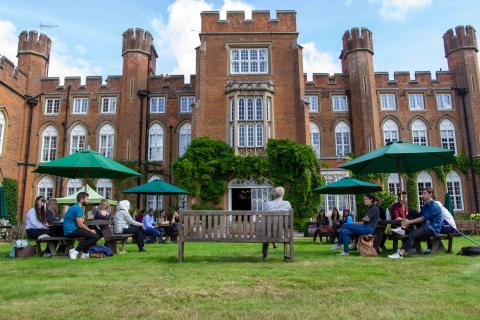I grew up in the US but decided to study both my master’s and PhD at the London School of Economics and Political Science in the UK because I wanted to work with my advisor, Jennifer Sheehy-Skeffington.
I spent almost a decade working abroad before I decided to do my PhD. That time helped me decide if the PhD made sense for me. It also helped strengthen the clarity and depth of my research questions through the advice and mentorship I received along the way.
My PhD research investigates how contexts of poverty and inequality shape decision-making. I was lucky enough to be able to work with my advisor before committing to the programme. That experience confirmed how much I admire her research, and the integrity with which she conducts it.
In the UK, the student-advisor relationship is crucial to the PhD experience, so I would recommend trying to get to know, or even work with, potential advisors before committing to your chosen PhD. If this isn’t possible, I would suggest talking to a potential advisor’s former doctoral students to understand what it would be like to work with them.
The process of applying for funding for the PhD, especially as an overseas student was intimidating. Because I knew who I wanted to work with, I was able to concentrate my efforts towards finding funding to complete my degree at LSE.
My advisor and the staff in my department were all incredibly helpful in directing me to internal funding opportunities. They also encouraged me to apply for external funding and connected me to the International Inequalities Institute, an interdisciplinary centre at LSE which now funds my studies.
Scholarships available in the UK for international students
How much does it cost to study in the UK?
A guide to student funding in the UK for international students
For students navigating the funding application process, I would suggest asking your potential advisor and staff within the department for recommendations on where to start. I would also keep an eye out for interdisciplinary funding opportunities geared towards your specific research topic.
I became a Cumberland Lodge Fellow in 2021. Cumberland Lodge is an educational charity running conferences and other events that are interdisciplinary, intergenerational and intercultural. Of the 84 fellows who have been involved in the fellowship since it began in 2014, more than 50 per cent have been from international backgrounds.
As well as opportunities to attend events at the Lodge (with meals, accommodation and travel costs covered), fellows benefit from skills training sessions to help them communicate their research and can also apply for a personal development grant to enhance their work.
The charity also runs an annual Life Beyond the PhD Conference in August and a Commonwealth and International Student Christmas Conference in December.
The fellowship provided me with opportunities to engage with a range of scholars, policymakers and people with diverse lived experiences.
It has also provided me with the much-needed space to step outside the boundaries of my specific topic of study. Perhaps most importantly, it has also introduced me to a community of friends and colleagues whose work and ideas I admire.
I would encourage any student completing a doctorate to consider applying for the fellowship or for something similar that connects you with people you might not otherwise meet during your PhD.
Applications for the Cumberland Lodge Fellowship 2024-26 will open in spring 2024.

Comments